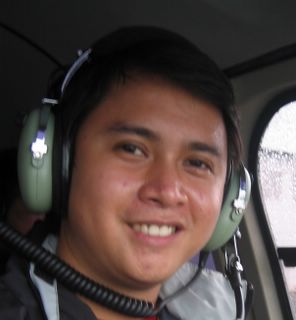Distorted Thinking of Voters

(Photo grabbed from TV Patrol Sabado March 3 2007)
“TV has distorted the thinking of a lot of Filipinos,” says former Senate President Jovito Salonga. To my face, he told me the medium that I use in my profession has gone awfully wrong.
Admittedly, television has contributed to the rise of actors and television personalities in Philippine politics. Without any prior experience in an elective position, actors Richard Gomez and Cesar Montano are trying their luck this May 14 polls. And yes, ex-comedian and former senator Tito Sotto is still very much around.
But what if Goma and Cesar won? Salonga says “If they go to the senate, can they enter into a debate with the likes of Joker Arroyo? Can they speak intelligently when they answer questions hurled at them by Kiko Pangilinan? Or will they just look at a script before they answer?
The 86-year old former senator is perhaps the most senior statesman alive. He has survived three administrations – Macapagal, Marcos and Aquino. He can’t help but compare his time to the present political conditions.
He practically says television nowadays is doing nothing to educate the voting public. He says the opposition and the administration bets have nothing to offer. “Ang nakikita mo lang e sa TV, wala namang sinasabing me katuturan na ikabubuti ng bayan.”
The veteran lawmaker also notes lesser known party “Ang Kapatiran” seems to have a clear platform of government. But they are hardly on the news.
As Salonga has observed, TV is to be blamed.
Or, is it the Commission on Elections?
In our newsroom, we were told to be extra careful on being used by candidates for election propaganda. Current Affairs Head Luchi Cruz-Valdes has repeatedly told us to determine first if a story is pure propaganda or legitimate news.
But the problem, there are no hard and fast rules set the by the Comelec. In fact, in the Implementing Rules and Regulations of the Fair Election Act, the word “propaganda” was not included in its definition of terms. So how can we tell if a story is propaganda material, if the poll body has not even clearly stated what propaganda means. If we air and elaborate on platforms of candidates, it may be construed as propaganda.
We were told at ABS-CBN that “candidates or their representatives should not be allowed to discuss their qualifications, accomplishments and PROGRAMS OF GOVERNMENT except if the same is a political advertisement, subject to the rules relating to the same.”
So we end up reporting “just the issues”. Like the ASO jingle. Or Kiko Pangilinan being dropped by the opposition in its campaign. Or Joker Arroyo and Ralph Recto going whitewater rafting. But what about their platforms?
I believe this why Jovito Salonga thinks TV has distorted the thinking of the Filipino voter. There is hardly any real news about the candidates – their qualifications, their platforms of government, basically what they have to offer if elected. Because in a way, we fear that the Comelec may retaliate if we air something which they think is propaganda material.
I think there is really nothing wrong with airing platforms of candidates, as long as we do not overdo it. There is a clear difference between an endorsement and a plain and simple news story. I think, and I hope every serious journalist knows this.
Now whatever happened to the constitutionally guaranteed right to free press? The media is supposed to be a self-regulating institution. Ever wondered wny there are no board exams for journalists? Because the constitution says “no law shall be passed abridging the freedom of speech, or of the press.”
Yes it can be argued that there are no specific laws clamping down on our right to free press. Basically, we can report what we think is a legit story as long as we have carefully determined and thought twice or thrice about the possibility of being used for propaganda.
In a way, it is also a good thing that we have become more analytical in our stories. At least what the viewers will be watching is a well-thought of and carefully written piece of news about the elections.
But fact is, Big Brother Benjamin Abalos is watching us. There is still this unfounded fear of being unfairly accused of airing propaganda material, resulting to some news stories without the real substance.
In the end, Jovito Salonga is right, TV has distorted the thinking of Filipinos. But worse, the distortion can go further if the system continues.
(Disclaimer: again, this is purely my opinion and not an official ABS-CBN blog.)


